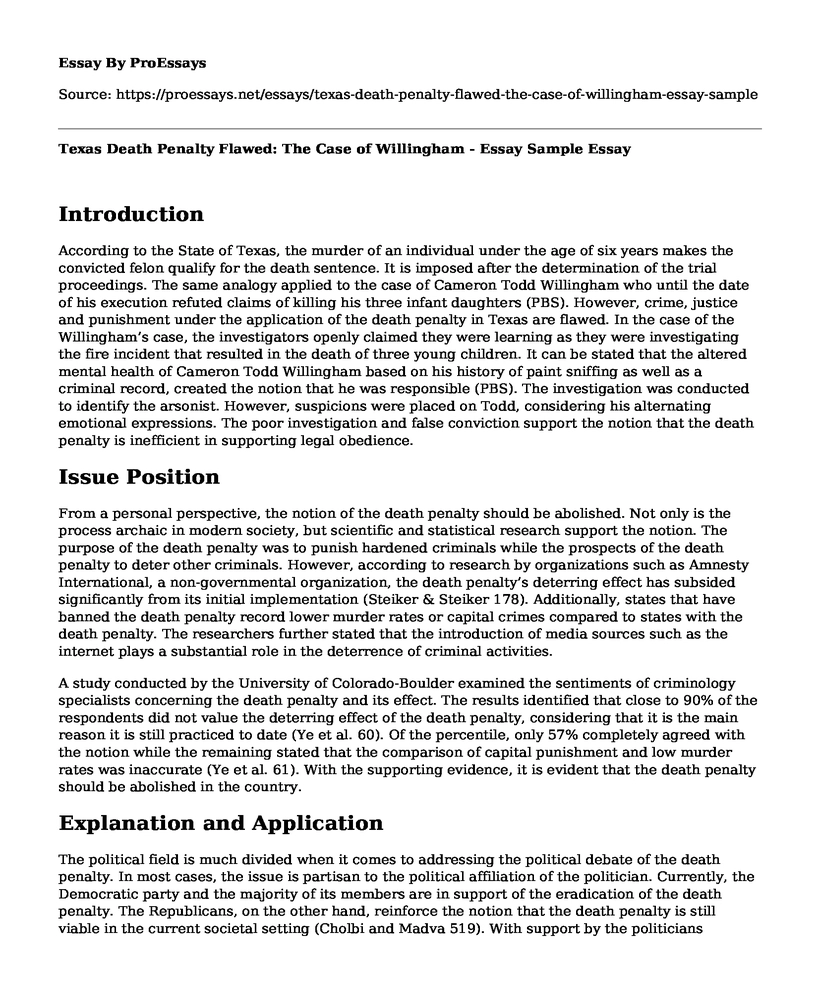Introduction
According to the State of Texas, the murder of an individual under the age of six years makes the convicted felon qualify for the death sentence. It is imposed after the determination of the trial proceedings. The same analogy applied to the case of Cameron Todd Willingham who until the date of his execution refuted claims of killing his three infant daughters (PBS). However, crime, justice and punishment under the application of the death penalty in Texas are flawed. In the case of the Willingham’s case, the investigators openly claimed they were learning as they were investigating the fire incident that resulted in the death of three young children. It can be stated that the altered mental health of Cameron Todd Willingham based on his history of paint sniffing as well as a criminal record, created the notion that he was responsible (PBS). The investigation was conducted to identify the arsonist. However, suspicions were placed on Todd, considering his alternating emotional expressions. The poor investigation and false conviction support the notion that the death penalty is inefficient in supporting legal obedience.
Issue Position
From a personal perspective, the notion of the death penalty should be abolished. Not only is the process archaic in modern society, but scientific and statistical research support the notion. The purpose of the death penalty was to punish hardened criminals while the prospects of the death penalty to deter other criminals. However, according to research by organizations such as Amnesty International, a non-governmental organization, the death penalty’s deterring effect has subsided significantly from its initial implementation (Steiker & Steiker 178). Additionally, states that have banned the death penalty record lower murder rates or capital crimes compared to states with the death penalty. The researchers further stated that the introduction of media sources such as the internet plays a substantial role in the deterrence of criminal activities.
A study conducted by the University of Colorado-Boulder examined the sentiments of criminology specialists concerning the death penalty and its effect. The results identified that close to 90% of the respondents did not value the deterring effect of the death penalty, considering that it is the main reason it is still practiced to date (Ye et al. 60). Of the percentile, only 57% completely agreed with the notion while the remaining stated that the comparison of capital punishment and low murder rates was inaccurate (Ye et al. 61). With the supporting evidence, it is evident that the death penalty should be abolished in the country.
Explanation and Application
The political field is much divided when it comes to addressing the political debate of the death penalty. In most cases, the issue is partisan to the political affiliation of the politician. Currently, the Democratic party and the majority of its members are in support of the eradication of the death penalty. The Republicans, on the other hand, reinforce the notion that the death penalty is still viable in the current societal setting (Cholbi and Madva 519). With support by the politicians claiming that the death penalty is highly flawed with high racial and ethnic bias. The notion by the political leaders only stems from reinforcing the notion that the death penalty should be removed permanently from the legal and correctional system. The objective is to allow for fair trials as well as allow for the accused to prove their innocence (Steiker & Steiker 201). In Willingham's case, he was falsely convicted as per the evidence that was found in support of his claim. Arson forensic investigation was still in its infancy, and it was used to convict and later execute Cameron Todd Willingham.
Works Cited
Cholbi, Michael, and Alex Madva. "Black Lives Matter And The Call For Death Penalty Abolition". Ethics, vol 128, no. 3, 2018, pp. 517-544. University Of Chicago Press, doi:10.1086/695988.
PBS. "Death By Fire". FRONTLINE, 2010, http://www.pbs.org/wgbh/pages/frontline/death-by-fire/. Accessed 10 June 2020.
Steiker, Carol S, and Jordan M Steiker. Comparative Capital Punishment. Edward Elgar Publishing, 2019.
Ye, Xinyue et al. "Analyzing Public Opinions On Death Penalty Abolishment". Chinese Sociological Dialogue, vol 3, no. 1, 2018, pp. 53-75. SAGE Publications, doi:10.1177/2397200918761665.
Cite this page
Texas Death Penalty Flawed: The Case of Willingham - Essay Sample. (2023, Aug 28). Retrieved from https://proessays.net/essays/texas-death-penalty-flawed-the-case-of-willingham-essay-sample
If you are the original author of this essay and no longer wish to have it published on the ProEssays website, please click below to request its removal:
- Course Work Example on Managed Healthcare
- Research Paper on Ted Bundy
- Research Paper on Gun Control Movement
- Essay Sample on Obama Care: Improving Lives of Millions in Texas
- Essay on OPP Detective Utilizes Reid Technique to Compel Serial Killer's Confession
- Cyberstalking: Fraud, False Allegations & Threats - Essay Sample
- Research Paper Sample on Collective Labor Rights







